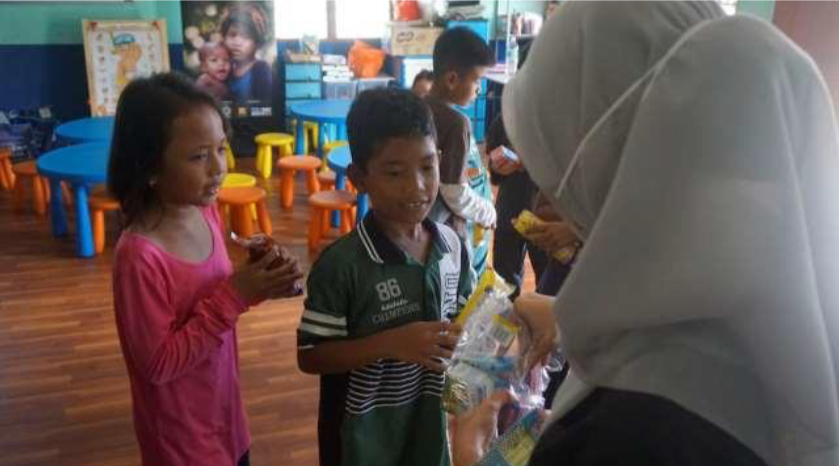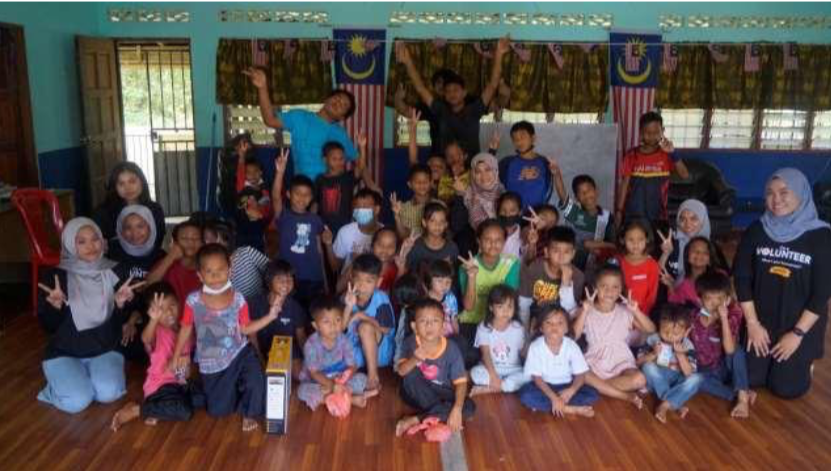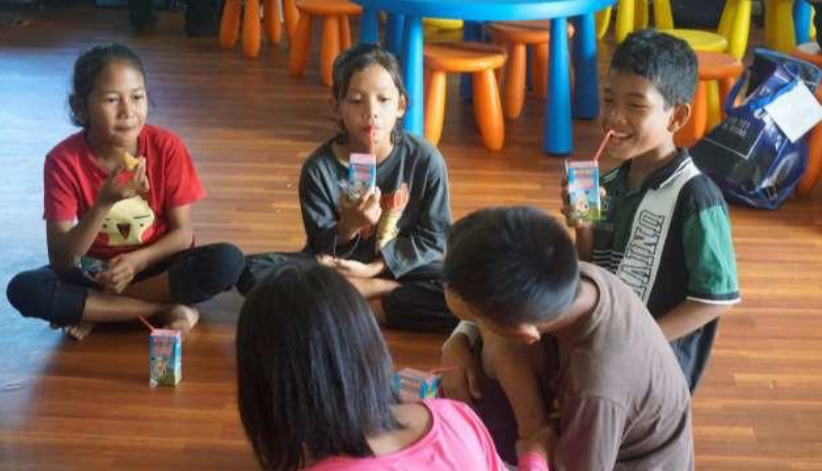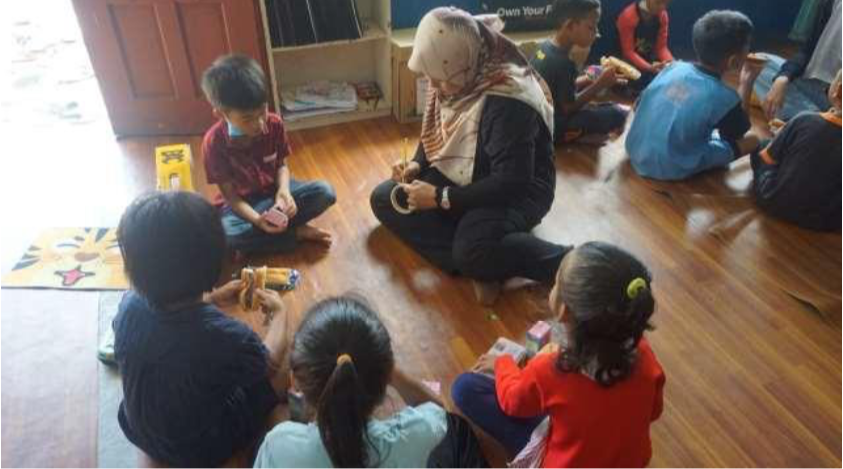Assessment of Snacks at
Orang Asli Settlements
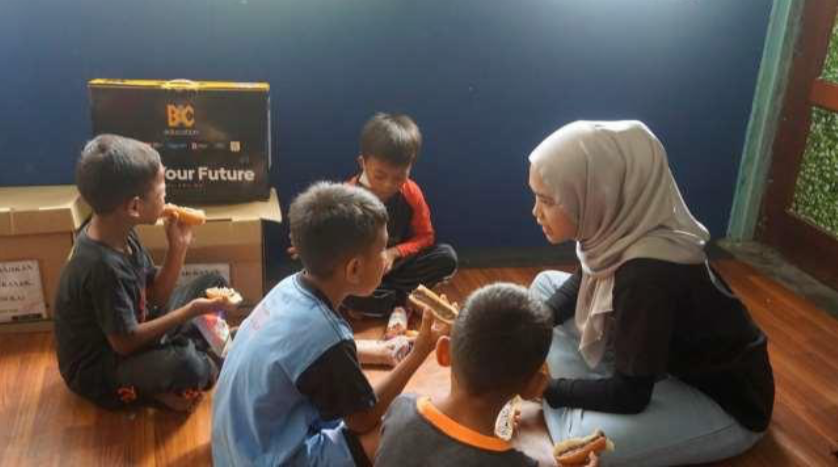
On 28th September 2022, UPLIFT (Pertubuhan Bangkit) conducted an Assessment on the Impact of Snacks provided by the Free Food Society (FFS) at the Orang Asli settlements of Kg. Serigala and Kg. Changkat Bintang in Ulu Selangor. The assessment aimed to evaluate the effects of providing nutritious snacks to children attending UPLIFT’s Tuition Programme at these settlements, focusing on whether the provision of snacks contributed to better attendance, energy levels and overall enthusiasm for learning.
Nutrition plays a critical role in the cognitive development and academic performance of children. Recognising this, UPLIFT, in collaboration with Free Food Society (FFS), introduced the distribution of healthy snacks during the weekly tuition sessions, aiming to improve the children’s focus and engagement. This assessment sought to understand how these snacks impacted the children’s learning experience and whether they contributed to an overall improvement in classroom dynamics.
The Importance of Nutrition in Education
For children in marginalised communities, access to consistent, nutritious meals can be a challenge. Poor nutrition often affects a child’s ability to concentrate, their energy levels and their overall motivation to attend school or extracurricular programmes. FFS, through its partnership with UPLIFT, provided snacks during the tuition classes as a way to address these challenges, ensuring that the children were nourished and ready to learn. By offering snacks during the tuition sessions, UPLIFT hoped to create a more positive and supportive learning environment, where children were not distracted by hunger and could fully engage in their education. The snacks also served as an incentive, encouraging regular attendance and participation in the classes.
Key Findings from the Assessment
The assessment focused on three main questions: whether the snacks improved the children’s energy and focus, whether they motivated children to attend the classes regularly and whether the provision of snacks had any impact on their overall well-being and academic performance.
Here are the key findings from the assessment:
Improved Energy and Engagement:
- The assessment revealed that the snacks had a positive impact on the children’s energy levels during the tuition sessions. Teachers and volunteers observed that the children were more alert, engaged and proactive in their learning after receiving the snacks.
- One of the key pieces of feedback gathered from the children was that they felt more energetic and better able to concentrate during lessons. This improvement in focus allowed them to participate more actively in class discussions and complete their assignments with greater enthusiasm.
Motivation to Attend Classes:
- Another important finding was that the snacks provided a sense of excitement and motivation for the children to attend the tuition sessions. For many of the children, especially those from economically disadvantaged families, the snacks were an added benefit that encouraged them to participate in the programme.
- Although the snacks were not the primary reason for attendance, they did contribute to the children’s eagerness to return each week, knowing that they would be well-fed and cared for during the sessions. This helped boost overall attendance rates and fostered a sense of continuity in their learning experience.
Support for Parents and Families:
- The assessment found that while the snacks were not seen as a substitute for meals provided by families, they offered additional support for parents, particularly those struggling to provide regular, nutritious food. The snacks ensured that children received an extra boost of nutrition during the day, alleviating some of the pressure on parents.
- While parents continued to provide meals before their children attended class, they expressed appreciation for the extra care shown through the provision of snacks, which contributed to their children’s health and well-being.
Positive Impact on Learning Outcomes:
- Although it is difficult to draw a direct correlation between the provision of snacks and improved academic performance, teachers observed that the children’s overall attitude toward learning improved. They were more focused on their studies, participated more in class activities and showed greater confidence in their abilities.
- The assessment suggested that the snacks contributed to a more positive learning environment, where children felt supported and cared for, ultimately leading to a more enjoyable and productive educational experience.
Challenges and Areas for Improvement
While the assessment highlighted several positive outcomes, it also revealed some areas where improvements could be made:
- Consistency of Snack Distribution: Ensuring that snacks are consistently available at every session is important to maintain the benefits seen in the children’s engagement and attendance. UPLIFT is working with FFS to streamline distribution and ensure that snacks are delivered regularly and on time.
- Variety and Nutritional Value: Although the snacks provided were generally nutritious, there is potential to introduce a wider variety of snacks that cater to the children’s specific dietary needs. UPLIFT and FFS are exploring options to include more fruits, proteins and balanced snacks that provide long-lasting energy.
Moving Forward: Expanding Nutritional Support
The findings of the Assessment of Snacks at Orang Asli Settlements demonstrate the value of integrating nutritional support into educational programmes. By addressing hunger and providing nutritious snacks, UPLIFT is not only enhancing the children’s ability to learn but also supporting their overall well-being. As the tuition programme at Kg. Serigala and Kg. Changkat Bintang continues to grow, UPLIFT plans to expand the snack distribution initiative. The organisation is seeking additional partners and donors to help sustain and enhance the programme, ensuring that more children benefit from this crucial support.
Furthermore, UPLIFT is exploring opportunities to introduce nutrition education into the tuition programme, teaching the children about the importance of healthy eating and how to make informed food choices. This will empower them with the knowledge they need to lead healthy, productive lives beyond the classroom.
The Assessment of Snacks at Orang Asli Settlements underscores the importance of addressing the nutritional needs of children in marginalised communities. By providing healthy snacks during the tuition sessions, UPLIFT has helped improve the focus, energy and engagement of the children, creating a more supportive learning environment.
As UPLIFT continues its mission to empower underserved communities, the organisation recognises that education and nutrition go hand in hand. The snack initiative at Kg. Serigala and Kg. Changkat Bintang is just one example of how UPLIFT is working to ensure that all children, regardless of their background, have the opportunity to thrive academically and physically.
With continued support from partners like the Free Food Society, UPLIFT is committed to expanding this programme and making a lasting difference in the lives of these children and their families.

